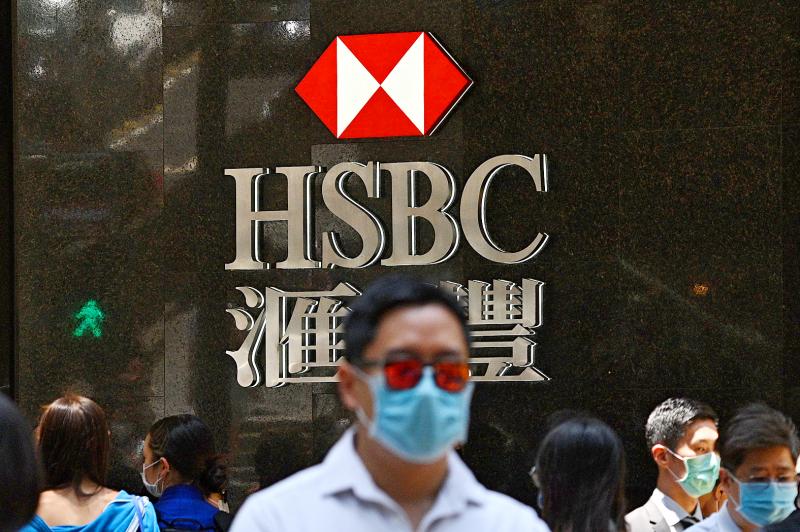Ninety-five percent of Taiwan’s financial firms think that sustainable finance would benefit businesses and enhance the stability of the nation’s financial systems, the results of a survey conducted by HSBC Bank (Taiwan) Ltd (匯豐台灣商銀) and the Taiwan Business Council for Sustainable Development showed on Tuesday.
The survey of 151 local financial firms in the banking, insurance, and securities and investment sectors was conducted in October and November last year.
Ninety percent of respondents have incorporated environmental, social and governance (ESG) factors into their decisionmaking process, it found.

Photo: AFP
Of those, 48 percent have established formal policies to require employees to take ESG factors into consideration when making investment decisions, while 24 percent consider ESG issues in some cases and 18 percent have no such policy.
Fifty-five percent of securities and investment consulting companies have established formal policies, which ranked first in the three financial sectors, followed by 50 percent of banks and 30 percent of insurers, the survey showed.
However, among the financial firms that have incorporated ESG factors into their investment decisionmaking process, only 33.3 percent think they are skilled in analyzing ESG factors, while other firms said it is difficult or costly to gain enough information on ESG, the survey found.
A lack of quantitative information on ESG, difficulty in verifying the information and disclosure of superfluous information were the main challenges for the respondents, the survey said.
Eighty-six percent of respondents believe that government policies and regulations were the major drivers for financial firms to implement sustainable finance.
However, implementation would not accelerate unless senior management supports the policies and a company has enough professionals, the poll said.
According to the survey, 48.9 percent of respondents have established goals to boost their sustainable finance business, with some focusing on responsible investment and others concentrating on developing ESG-related products, such as ESG bonds or funds.
Ninety-five percent of securities and investment consulting companies expect sustainable investment to increase, compared with 93.9 percent of banks and 92.3 percent of insurers, the poll found.
Overall, more than 60 percent of respondents thought that boosting sustainable finance would help improve their financial performance, the survey showed.
“Sustainable finance is one of HSBC’s global development goals, and shows great potential in the local stock market,” HSBC Taiwan chief executive officer Adam Chen (陳志堅) said in a statement.

South Korea’s equity benchmark yesterday crossed a new milestone just a month after surpassing the once-unthinkable 5,000 mark as surging global memory demand powers the country’s biggest chipmakers. The KOSPI advanced as much as 2.6 percent to a record 6,123, with Samsung Electronics Co and SK Hynix Inc each gaining more than 2 percent. With the benchmark now up 45 percent this year, South Korea’s stock market capitalization has also moved past France’s, following last month’s overtaking of Germany’s. Long overlooked by foreign funds, despite being undervalued, South Korean stocks have now emerged as clear winners in the global market. The so-called “artificial intelligence

Chinese artificial intelligence (AI) start-up DeepSeek’s (深度求索) latest AI model, set to be released as soon as next week, was trained on Nvidia Corp’s most advanced AI chip, the Blackwell, a senior official of US President Donald Trump’s administration said on Monday, in what could represent a violation of US export controls. The US believes DeepSeek will remove the technical indicators that might reveal its use of American AI chips, the official said, adding that the Blackwells are likely clustered at its data center in Inner Mongolia, an autonomous region of China. The person declined to say how the US government received

FORTUNES REVERSED: The new 15 percent levies left countries with a 10 percent tariff worse off and stripped away the advantage of those with a 15 percent rate In a swift reversal of fortunes, countries that had been hardest hit by US President Donald Trump’s tariffs have emerged as the biggest winners from the US Supreme Court’s decision to strike down his emergency levies. China, India and Brazil are among those now seeing lower tariff rates for shipments to the US after the court ruled Trump’s use of the International Emergency Economic Powers Act to impose duties was illegal. While Trump subsequently announced plans for a 15 percent global rate, Bloomberg Economics said that would mean an average effective tariff rate of about 12 percent — the lowest since

Standard Chartered Bank Taiwan’s newly appointed chief executive officer, Anthony Yu (游天立), yesterday unveiled an ambitious growth strategy for the bank’s wealth management division, reflecting a bullish outlook on Taiwan’s high-net-worth market. Yu, the first local executive to lead Standard Chartered Bank’s Taiwan operations, emphasized rising client demand and detailed plans to expand the bank’s digital capabilities, as well as its physical presence across the country. Standard Chartered Taiwan saw a remarkable surge in new wealth management clients last month, with the number of clients holding assets equivalent to US$1 million more than doubling compared with the same month last year, he